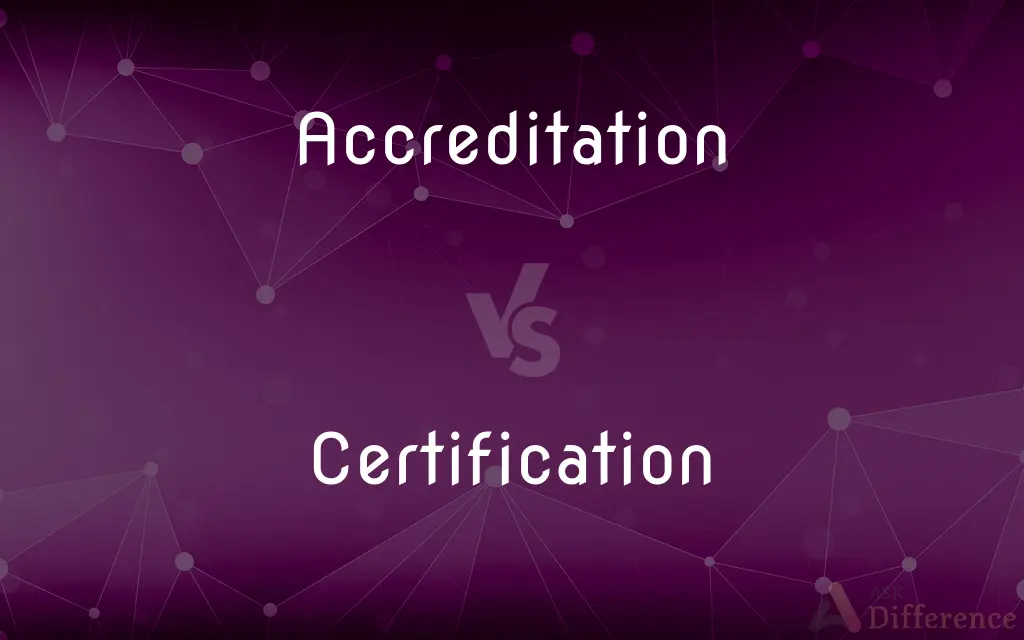Accreditation vs. Certification — What's the Difference?
By Maham Liaqat & Fiza Rafique — Updated on April 3, 2024
Accreditation is the process by which institutions or programs are recognized as meeting certain standards, while certification recognizes individuals or products for meeting specific standards.

Difference Between Accreditation and Certification
Table of Contents
ADVERTISEMENT
Key Differences
Accreditation is a formal, independent verification that an organization or program meets established quality standards and is competent to carry out specific functions. It is often associated with educational institutions and healthcare organizations, ensuring they provide a level of education or service that meets the criteria set by accrediting bodies. On the other hand, certification is a declaration, typically by an independent body, that an individual, product, or service meets specific standards, often demonstrated through examinations, assessments, or audits. Certification is commonly used in professional fields, indicating proficiency, skills, or quality.
In the educational context, accreditation assesses the entirety of an institution or specific programs it offers, looking at aspects such as curriculum quality, faculty qualifications, and resources available to students. Certification in education, however, might apply to teachers or educational products, indicating that they meet certain professional standards of knowledge and competence.
In healthcare, accreditation might involve the evaluation of hospitals or healthcare programs to ensure they meet national or international standards in delivering care. Certification could apply to healthcare professionals, such as nurses or doctors, attesting to their qualifications and ability to provide care at a certain standard.
Accreditation is typically a more comprehensive process that looks at the organization or program as a whole, considering a broad range of criteria over a longer assessment period. Certification focuses more narrowly on specific individuals, products, or services, and often requires periodic renewal or continuing education to maintain.
While both accreditation and certification serve to uphold standards, accreditation focuses on the capability and general quality of institutions or programs, whereas certification validates the specific abilities, knowledge, or quality of individuals or products.
ADVERTISEMENT
Comparison Chart
Focus
Institutions, programs.
Individuals, products, services.
Purpose
Verifies meeting of broad quality standards.
Validates specific standards of proficiency or quality.
Process
Comprehensive evaluation of many criteria.
Focused assessment or examination.
Issued by
Accrediting bodies or agencies.
Independent or professional organizations.
Common in
Education, healthcare.
Professional fields, product safety.
Renewal
Periodic review, less frequent.
Often requires periodic renewal or continuing education.
Compare with Definitions
Accreditation
Recognition of meeting quality standards by institutions or programs.
The university's business school recently received accreditation from a prestigious agency.
Certification
A declaration of meeting specific standards, often for individuals.
After passing the exam, she received her certification in project management.
Accreditation
A status granted after a comprehensive review.
Achieving accreditation was a year-long process involving multiple evaluations.
Certification
Validation of product safety or compliance.
The device received certification for its energy efficiency.
Accreditation
A process for ensuring educational or healthcare institutions meet certain criteria.
Hospital accreditation is crucial for patient trust and safety.
Certification
Evidence of quality or performance.
The software's certification attests to its reliability and security.
Accreditation
An endorsement that an organization is competent to perform certain functions.
The laboratory's accreditation ensures its testing results are reliable.
Certification
A credential indicating proficiency in a particular area.
Professional certification can enhance job prospects significantly.
Accreditation
Verification by an authoritative body.
The program's accreditation by the national agency elevates its status significantly.
Certification
Requirement for practice in certain professions.
Certification is mandatory for accountants in most jurisdictions.
Accreditation
Accreditation is the independent, third-party evaluation of a conformity assessment body (such as certification body, inspection body or laboratory) against recognised standards, conveying formal demonstration of its impartiality and competence to carry out specific conformity assessment tasks (such as certification, inspection and testing).Accreditation bodies are established in many economies with the primary purpose of ensuring that conformity assessment bodies are subject to oversight by an authoritative body. Accreditation bodies, that have been peer evaluated as competent, sign regional and international arrangements to demonstrate their competence.
Certification
Certification is the formal attestation or confirmation of certain characteristics of an object, person, or organization. This confirmation is often, but not always, provided by some form of external review, education, assessment, or audit.
Accreditation
The act of accrediting or the state of being accredited, especially the granting of approval to an institution of learning by an official review board after the school has met specific requirements.
Certification
The act of certifying.
Accreditation
The giving of credentials.
Certification
The state of being certified.
Accreditation
The act of accrediting.
Letters of accreditation.
Certification
A certified statement.
Accreditation
(education) The granting of approval to an institution of higher learning by an official review board after the school has met certain requirements.
Certification
The act of certifying.
Accreditation
The act of accrediting; as, letters of accreditation.
Certification
The granting of a certificate.
Accreditation
The act of granting credit or recognition (especially with respect to educational institution that maintains suitable standards);
A commission is responsible for the accreditation of medical schools
Certification
A professional qualification that certifies a person's ability.
Certification
The act of certifying.
Certification
The act of certifying or bestowing a franchise on
Certification
Confirmation that some fact or statement is true
Certification
A document attesting to the truth of certain stated facts
Certification
Validating the authenticity of something or someone
Common Curiosities
What is accreditation?
Accreditation is the process by which institutions or specific programs are recognized as meeting established quality and performance standards by a relevant accrediting body.
What does certification mean?
Certification is the recognition that an individual, product, or service meets specific standards of knowledge, skill, or quality, typically confirmed through examinations or assessments.
Can an individual be accredited?
Typically, individuals are certified rather than accredited. Accreditation is reserved for institutions and programs.
How does one achieve accreditation?
Achieving accreditation involves undergoing a comprehensive review and evaluation process by an accrediting agency to ensure that the institution or program meets the established standards.
What is required for certification?
Certification usually requires passing an examination or assessment that validates the individual’s or product’s compliance with specific standards.
Are there costs associated with obtaining accreditation or certification?
Yes, both processes can involve significant costs, including fees for the application, review, and maintenance of the status.
What happens if an institution loses its accreditation?
If an institution loses its accreditation, it may lose eligibility for government funding, and its students may not qualify for certain professional certifications or employment opportunities.
Do accreditation and certification standards vary by country?
Yes, standards for accreditation and certification can vary significantly by country, especially since different nations have their own accrediting and certifying bodies with unique criteria.
How often must accreditation and certification be renewed?
Accreditation is typically reviewed every few years, while certification may require more frequent renewal or ongoing education to maintain.
Is accreditation or certification more important?
The importance of accreditation versus certification depends on the context. Accreditation is crucial for institutions to demonstrate overall quality and capability, while certification is key for individuals or products to show proficiency or compliance in specific areas.
Can a program be both accredited and certified?
A program itself is typically accredited, indicating it meets certain educational standards, while individuals or products associated with the program may be certified.
Can certification affect employment?
Yes, certification can significantly impact employment opportunities and advancement, as it demonstrates a recognized level of expertise or qualification in a specific field.
Is accreditation mandatory for all educational institutions?
While not all educational institutions are required to be accredited, accreditation is important for student eligibility for federal financial aid and assurance of educational quality.
Who oversees accreditation and certification bodies?
Accreditation bodies are often overseen by national or international standards organizations, while certification bodies can be regulated by industry-specific oversight committees or professional associations.
What are the benefits of accreditation and certification?
Both provide formal recognition of meeting specific standards, which can enhance reputation, trustworthiness, and opportunities for individuals, products, and institutions.
Share Your Discovery

Previous Comparison
Bum vs. Villain
Next Comparison
Hoof vs. FeetAuthor Spotlight
Written by
Maham LiaqatCo-written by
Fiza RafiqueFiza Rafique is a skilled content writer at AskDifference.com, where she meticulously refines and enhances written pieces. Drawing from her vast editorial expertise, Fiza ensures clarity, accuracy, and precision in every article. Passionate about language, she continually seeks to elevate the quality of content for readers worldwide.














































